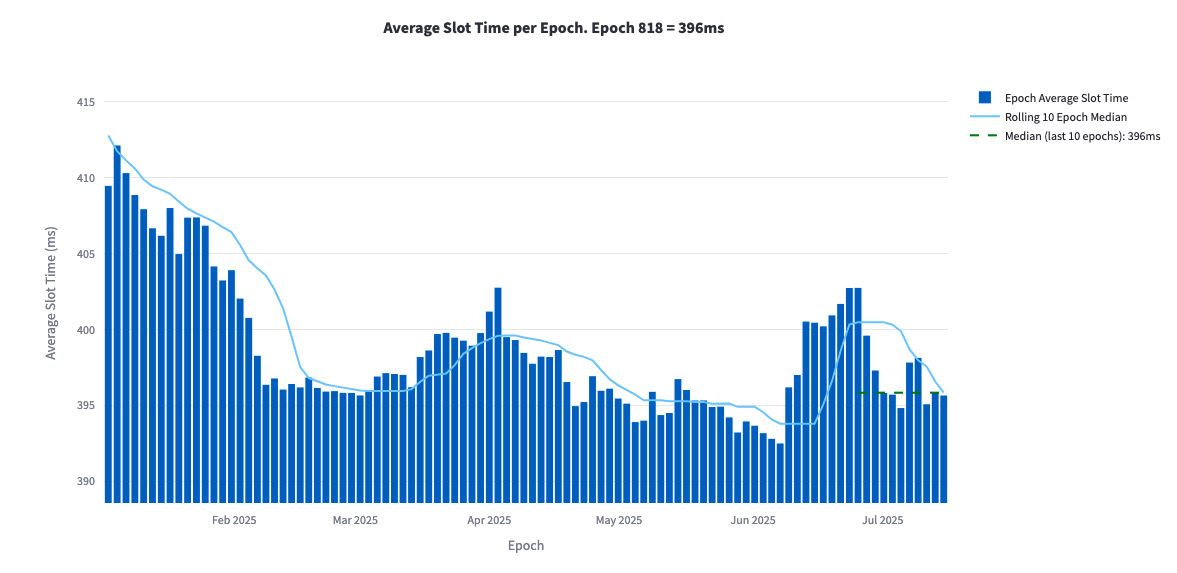In June, the network speed slowed down, not due to technical reasons.
Author: Jack Kubinec
Compiled by: Deep Tide TechFlow
As Solana's code issues have gradually been resolved over the past few years, block time (the time required for the network to generate new transaction blocks) has significantly decreased, even falling below its nominal 400 milliseconds.
However, an interesting trend has emerged over the past month: the median block time (a key performance metric in blockchain networks that reflects the speed at which the network processes transactions and generates blocks) has surged, and Solana's speed of adding new transactions to the blockchain has slowed down. The reason lies in a new validator strategy, indicating that slow block generation may be more profitable. According to Blockworks, Anza, Jito, and Marinade are considering solutions to this issue.

Each Solana block has a validator acting as a leader—responsible for collecting transactions, creating blocks, and broadcasting them to the network. Leaders earn transaction fees by creating blocks. More order flow means more fee opportunities, so validators may choose to process transactions in 500 milliseconds instead of 300 milliseconds to increase profits.
At a fundamental level, some Solana validators seem to be waiting as long as possible to pack more transactions into blocks, thereby maximizing their earnings. This behavior has led to an increase in Solana's cycle length.
For a network committed to being as fast as Nasdaq, this is clearly not an ideal situation. Additionally, a reduction in cycles means fewer compounding opportunities for staking rewards, a point raised by Max Kaplan, Chief Technology Officer of Sol Strategies.
Solana offers a mechanism called "grace ticks," which is a delay period that allows leaders to successfully submit blocks. This mechanism is designed to prevent unfair penalties for validators in remote locations but also opens the door for validators to intentionally delay block submissions.
Moreover, Solana's alternative client Frankendancer recently released a revenue-maximizing scheduler.
According to Kaplan, validators running this client seem to be packaging blocks at a slightly slower than normal speed. However, Kaplan added that the delays of Frankendancer are negligible compared to more severe delayers, and he does not consider this a "bad thing." Furthermore, block delays are not a new concept on proof-of-stake blockchains. However, the upgrade of Firedancer may make this strategy more prominent on Solana. Jump has not commented on this.
Interestingly, Firedancer software engineer Michael McGee described this phenomenon on this week's Lightspeed podcast. He mentioned, “One thing we see in the current validators is… [validators] tend to create more profitable blocks by delaying transaction execution.”
Blockworks Research analyst Victor Pham pointed out that those Solana validators that exhibit more noticeable block delays are typically running modified versions of the Agave-Jito client.
For instance, during the 802nd cycle in mid-June, the median block times for Galaxy and Kiln both exceeded 570 milliseconds. According to Solana Compass data, some unmarked validators also operated slowly, with Temporal's validators having a median block time of 475 milliseconds.
Kiln co-founder Ernest Oppetit acknowledged that their validator—Solana's sixth-largest staking validator—had delayed block slots for a period but stated that this behavior has now ceased.
“At Kiln, we pride ourselves on providing the highest staking annual percentage yield (APY) in the market without sacrificing security. We have been researching different parts of the tech stack, including timing strategies, and maintaining ongoing discussions with clients, client teams, and the foundation. Currently, we are following the specifications and no longer delaying blocks, but many other validators still are. We believe that the incentive issues (where fast block generation leads to reduced rewards) ultimately need to be addressed at the protocol level,” Oppetit said.
Temporal's engineering director Ben Coverston, when asked about their validators' apparent involvement in the slow block trend, stated, “I can say that we are not making people aware of the reasons for this phenomenon.”
A spokesperson for Galaxy stated, “As a service provider, we support validator configurations that prioritize maximizing client staking rewards. On Solana, this may mean proposing slightly slower blocks to ensure higher reward acquisition. Galaxy has also been responsive to community feedback and has adjusted block times to acceptable ranges.”
However, the Solana validator community generally believes that slowing down the network is inappropriate, and slow validators are currently facing strong public backlash.
They may soon face more substantial penalties. According to Blockworks, Jito plans to blacklist slow validators from its staking pool, which is the largest on the Solana network.
Jito Foundation Chairman Brian Smith stated that the organization is “drafting a governance proposal to empower a committee to remove underperformers from the JitoSOL delegation pool. This proposal should be open for community discussion in a few days.”
Marinade co-founder Michael Repetny indicated that the staking pool provider is “considering submitting this issue as a governance proposal to discuss the pros and cons of treating [slow validators] as a hard rule/violation of delegation strategy.”
Protocol-level solutions are also being advanced. Anza's GitHub repository shows a new proposal suggesting halving Solana's grace tick period. Additionally, the consensus mechanism reform proposed by Solana is expected to address this issue.
“Alpenglow will address this issue by enabling a skip voting feature,” said Brennan Watt, Vice President of Core Engineering at Anza.
Watt revealed in a recent episode of the Lightspeed podcast that Anza hopes to launch Alpenglow on the mainnet before the Solana Breakpoint conference in December this year.
免责声明:本文章仅代表作者个人观点,不代表本平台的立场和观点。本文章仅供信息分享,不构成对任何人的任何投资建议。用户与作者之间的任何争议,与本平台无关。如网页中刊载的文章或图片涉及侵权,请提供相关的权利证明和身份证明发送邮件到support@aicoin.com,本平台相关工作人员将会进行核查。




